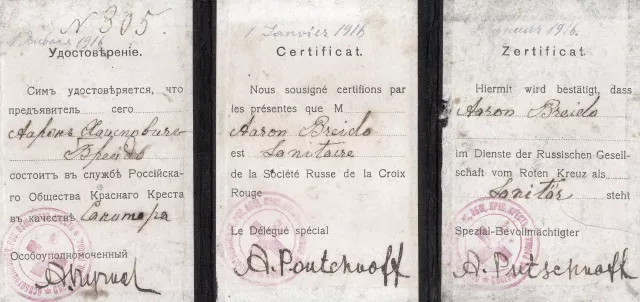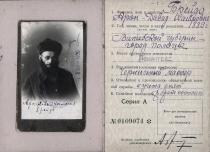Aron Breido’s certificate of membership in the Russian Red Cross Society
This is my father's certificate, it served as a pass as well as an ID card, when he served as a corps man at the frontline hospital during the World War I.
My father Aron-David Khaimovich Breido was born in St.Petersburg in 1889. Soon after his birth the family moved to Polotsk.
At a certain age he went to cheder, though he studied there for one and a half years only. When the family returned to St.Petersburg in 1897, he did not study at official institutions.
He began to work at an early age, as well as his brothers. At first he worked as a "boy" at the "Brichken & Robinson" confectionary.
At the age of 11 he became an apprentice at his father's handicraft shop.
He mastered the secondary school course on his own, with the help of grandfather, great grandfather and a large number of books, which he read and ordered later on.
He was even allowed to indicate in formal papers that he obtained secondary education, though he never took any exams anywhere. Father was a very capable person, he had an exceptional photographic memory, and if he had studied, he could have achieved a lot.
He was chosen by grandfather from childhood to proceed with the family business, though he did not have a special chemical education, but he was a wonderful self-taught person.
Since the age of 16 he was a member of that free philosophical society, he visited the great writer Lev Tolstoy in Yasnaya Polyana and received one or two letters from him, which were destroyed later on, when the Tolstoyans were persecuted.
Father became a vegetarian since that time, never ate either fish or meat, or eggs. He was an Orthodox Jew, but he was interested not only in studying religion, but paid interest to the issue of life and death, as well as to other philosophical issues, since his youth.
The theory of "non-resistance to evil with violence" of Lev Tolstoy was very congenial to him. There were people of various nations among the Tosltoyans, including a lot of Jews.
This theory did not contradict the Jewish religion; its main thesis was the absence of violent pressure on a personality. In a way it agreed with the Hebraic religious teaching.






















